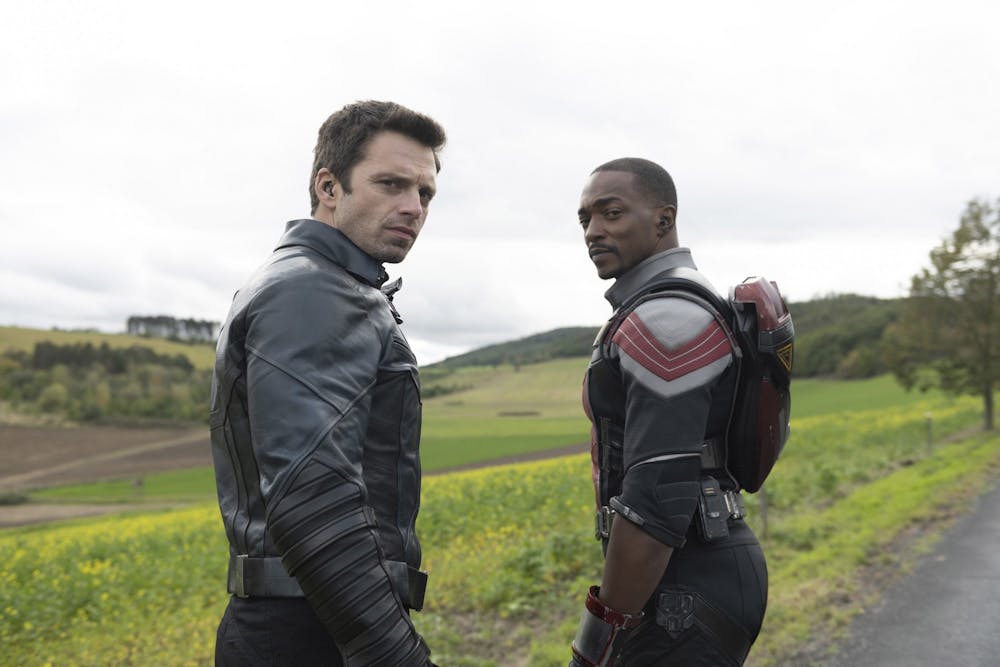When Marvel first announced "The Falcon and the Winter Soldier" back in 2019, I was immediately overjoyed.
Both titular heroes made their first Marvel Cinematic Universe appearances in the "Captain America" films, most notably "Captain America: The Winter Soldier" in 2014. That installment has remained my all-time favorite Marvel movie since its premiere, so I was excited at the prospect of an entire series focusing on two characters who are, in my opinion, some of the most interesting in the MCU.
The first episode of "The Falcon and the Winter Solider" takes place a few months after the events of "Avengers: Endgame" and follows two — separate but later intersected — storylines of Sam Wilson, also known as the Falcon (played by Anthony Mackie) and Bucky Barnes, or the Winter Solider (played by Sebastian Stan).
At the end of "Endgame," an aged-up Steve Rogers passes on his shield to Sam, telling him to take up the mantle of Captain America so Steve can live out the rest of his days with the love of his life, Peggy Carter.
In the new series, Sam is faced with a decision on whether or not to turn the shield over to the government, believing himself unworthy of being the next Captain America. He continues to work as the Falcon as he investigates an anarchist group called the Flag Smashers.
Conversely, Bucky is introduced in the show as trying to make amends for his crimes under the guise of the Winter Solider, the HYDRA-brainwashed assassin. He attends court-mandated therapy sessions and continues to suffer from nightmares about the people he's killed.
The show picks up pace when Sam and Bucky reunite, as the two actors have amazing chemistry both on- and off-screen. Bucky joins Sam in taking down the Flag Smashers, and their shenanigans include impressive enemy fight scenes juxtaposed with endless banter that lands them in what is essentially couples therapy. This makes for humorous but emotional scenes that add greater depth to both characters.
My favorite aspect about the show is the opportunity for further character development, which has only just cracked the surface.
Marvel's new series', including this one and "WandaVision," share this commonality. Something about them feels distinctly different from the action-packed blockbuster films Marvel is best known for. I mean this in a good way — the show has its fair share of exciting fight scenes, but the television format offers more time for expansion upon characters' emotions and relationships that a two- to three-hour film simply does not.
READ MORE: "Wandavision" blew my expectations out of the water
Not only does the Disney+ show make the bold move of hinting at Bucky Barnes' possible bisexuality but it also explores issues of racial injustice and discrimination.
One of the most prominent examples of racism occurs in the second episode, when the heroes visit a Black super-soldier named Isaiah, who was experimented on like Bucky. Isaiah tells the heroes how he was sent to jail for 30 years for simply following orders.
"You know what they did to me for being a hero? They put my a-- in jail for thirty years. People running tests, taking my blood, coming into my cell. Even your people weren't done with me," he said, pointing at Bucky.
It is unclear whether Isaiah is referring to Bucky's people as Hydra, the terrorist organization responsible for programming the Winter Soldier, or if it was a comment about Bucky's whiteness.
After leaving Isaiah's residence, Sam starts to ask Bucky questions about Isaiah, and the two get into another one of their characteristic heated arguments, as a pair of police cars drive down the street behind them.
Two cops then approach them and ask Sam for identification, which he does not have on him. One cop turns to Bucky and asks if Sam is bothering him.
"No, he's not bothering me," Bucky responds. "Do you know who this is?"
It isn't until after the cop recognizes Sam as an Avenger that he identifies Sam is not a threat.
The white officer's profiling of Sam as a threat to Bucky is representative of a very real issue that plagues society. Other pieces of media have made similar points, including the 2017 horror movie "Get Out," in which the main character is the target of apparent racial profiling by a white police officer after his girlfriend hits a deer, and Chris is asked for his identification despite the fact he was not the one driving the car. It isn't until his white girlfriend speaks up that the officer drops it.
The move by Marvel to call attention toward systematic racism comes less than a year after Mackie openly spoke out about the film company's issues of racism behind the scenes.
The new Disney+ series turned out to be better than I expected, and that is saying a lot. Even after just a couple episodes, I feel completely invested in the story and cannot wait to see what Sam and Bucky do next. With the time allotted for deeper expansion into characters and relevant themes, I am looking forward to seeing how the rest of this series plays out.
Reach the reporter at erfontan@asu.edu or follow @EndiaRain on Twitter.
Like The State Press on Facebook and follow @statepress on Twitter.
Continue supporting student journalism and donate to The State Press today.




